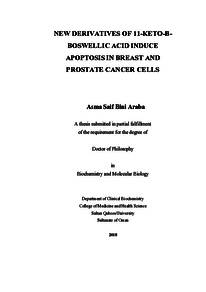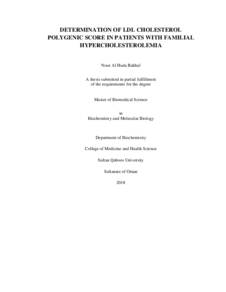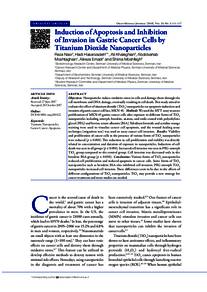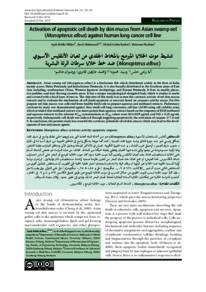Document
New derivatives of 11-keto-β-boswellic acid induce apoptosis in breast and prostate cancers cells
Publisher
Sultan Qaboos University
Gregorian
2018
Language
English
English abstract
Number of annual deaths due to cancer is dramatically increasing despite the advances in the treatment strategies. Boswellic acids are natural active constituents of resins obtained from the genus Boswellia. New series of 11- keto-β-boswellic acids (AKBA) were partially-synthesized by modifying the hydroxyl and carboxylic acid functional groups of ring A. The most active compounds of this series gave IC50 values as low as 9.6m M using two different human tumor cell lines. The results revealed that the selectivity of natural AKBA was higher than new derivatives with IC50 value of 1014 μM and EC50 dose of 1006 μM when tested on normal epithelial cell lines. Additionally, a maximum nuclear fragmentation was observed for compound 4 (78.44%) in treated cells after 24 hours followed by compounds 5 and 9 with (74.25 and 66.9% respectively). This study suggests that the presence of a hydrazone functionality (compounds 4 and 9) has effectively improved the potency of AKBA. Interestingly, compound 5 with a lost carboxylic acid group of ring A showed comparable potent activity. Highly selective AKBA requires further modification to improve its bioavailability and solubility inside the cancer cells.
Proteomic profiling of AKBA-treated cells revealed a novel role of AKBA in cancer treatment via induction of mitophagy through upregulation of SQSTM1 protein. Mitophagosomes and mitochondrial abnormalities were shown in AKBA -treated cells. Increased SQSTM1 protein levels was not mediating via alteration in proteosomal degradation. This suggests that AKBA increases SQSTM1 levels at gene transcription levels and not at translation and post- translation levels In conclusion; Derivatization of AKBA does not enhance the potency and selectivity, thereby, further investigation to improve its bioavailability and solubility inside the cancer cells is highly recommended. We provided novel evidence that AKBA-induced apoptosis of cancer cells by initiating mitophagy pathway through targeting SQSTM1 protein expression. Our findings could provide a rationale for further investigation of this valuable compound in chemoprevention and/or treatments in cancer disease.
Member of
Resource URL
Arabic abstract
عدد الوفيات السنوية بسبب السرطان يتزايد بشكل كبير على الرغم من التقدم في استراتيجيات العلاج أحماض اللبان هي المكونات الأنشطة الطبيعية اللبان التي تم الحصول عليها من جنس Boswellia. تم تركيب سلسلة جديدة من الأحماض 11كيتو. KBA) boswellic )-م جزئيا عن طريق تعديل مجموعات وظيفية حمض الهيدروكسيل والكربوكسيلية من الحلقة 4 أعطت المركبات الأكثر نشاطا من هذه السلسلة قيم IC50 منخفضة تقدر ب 96 استخدام نوعين مختلقين الخلايا الورم البشري. أظهرت النتائج أن انتقائية AKBA الطبيعي كانت أعلى من المشتقات الجديدة مع قيمة IC50 تقدر ب 1014 میکرومتر و EC50 من 1006 میکرومتر عند اختيارها على الخلايا السليمة. بالإضافة إلى ذلك ، لوحظ الحد الأقصى للتجزئة النووية للمركب 4 ( 78. 44 %) في الخفية المعالجة بعد 24 ساعة متيو گا بالمركبين 5 و ومع (7425 و 669% على التوالي).
تشير هذه الدراسة إلى أن وجود وظيفة هيدرازون (المركبات 4 و 9) قد أدى إلى تحسين فعالية AKBA ومن المثير للاهتمام أن المركب 5 مع مجموعة حمض كاربوكسيلي المفقودة من الحلقة 4 أظهر نشاطا قويا ممائة تتطلب الانتقائية العالية ل AKBA مزيدا من التعديل لتحسين إتاحتها الحيوية وقابليتها للذوبان داخل الخلايا السرطانية
كشفت التنميط البروتيري للخلايا المعالجة بAKBA دورا جديدا ل AKBA في علاج السرطان عن طريق تحريض mitophagy من خلال زيادة البروتين SQSTM1. تم عرض شذوذات الميتوكوندريا والميتوكوندريا في الخلايا المعالجة بالأكاديمية AKBA. زيادة مستويات بروتين SQSTM1 لم تكن تتوسط من خلال التغير في التحلل البروتوزومي. هذا يشير إلى أن AKBA يزيد من مستويات SQSTM1 عند مستويات النسخ الجيني وليس على مستويات الترجمة و ما بعد الترجمة.
في الختام، لا يؤدي اشتقاق AKBA إلى تعزيز الفعالية والانتقائية ، وبالتالي ، يوصي بإجراء مزيد من الدراسات لتحسين قدرته على التوافر الحيوي والقابلية للذوبان داخل الخلايا السرطانية في هذه الدراسة نحن نقدم دليلا جديدا على أن AKBA يقوم بقتل الخلايا السرطانية من خلال البدء في مسار mitophagy من خلال استهداف البروتين SQSTM1. يمكن أن توفر نتائجنا الأساس المنطقي لمزيد من البحث في هذا المركب القيم في العلاج الكيمياوي و أو علاج مرض السرطان.
تشير هذه الدراسة إلى أن وجود وظيفة هيدرازون (المركبات 4 و 9) قد أدى إلى تحسين فعالية AKBA ومن المثير للاهتمام أن المركب 5 مع مجموعة حمض كاربوكسيلي المفقودة من الحلقة 4 أظهر نشاطا قويا ممائة تتطلب الانتقائية العالية ل AKBA مزيدا من التعديل لتحسين إتاحتها الحيوية وقابليتها للذوبان داخل الخلايا السرطانية
كشفت التنميط البروتيري للخلايا المعالجة بAKBA دورا جديدا ل AKBA في علاج السرطان عن طريق تحريض mitophagy من خلال زيادة البروتين SQSTM1. تم عرض شذوذات الميتوكوندريا والميتوكوندريا في الخلايا المعالجة بالأكاديمية AKBA. زيادة مستويات بروتين SQSTM1 لم تكن تتوسط من خلال التغير في التحلل البروتوزومي. هذا يشير إلى أن AKBA يزيد من مستويات SQSTM1 عند مستويات النسخ الجيني وليس على مستويات الترجمة و ما بعد الترجمة.
في الختام، لا يؤدي اشتقاق AKBA إلى تعزيز الفعالية والانتقائية ، وبالتالي ، يوصي بإجراء مزيد من الدراسات لتحسين قدرته على التوافر الحيوي والقابلية للذوبان داخل الخلايا السرطانية في هذه الدراسة نحن نقدم دليلا جديدا على أن AKBA يقوم بقتل الخلايا السرطانية من خلال البدء في مسار mitophagy من خلال استهداف البروتين SQSTM1. يمكن أن توفر نتائجنا الأساس المنطقي لمزيد من البحث في هذا المركب القيم في العلاج الكيمياوي و أو علاج مرض السرطان.
Category
Theses and Dissertations




